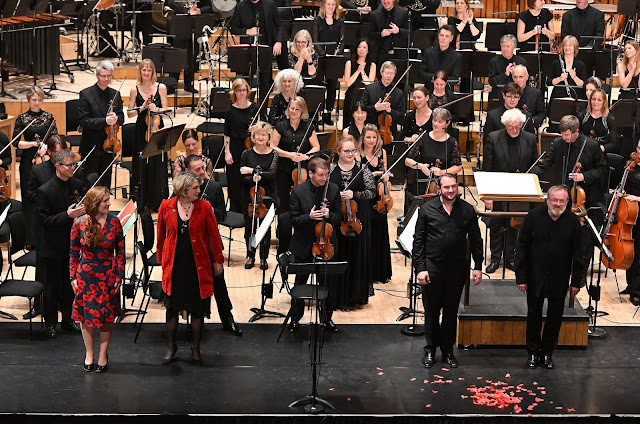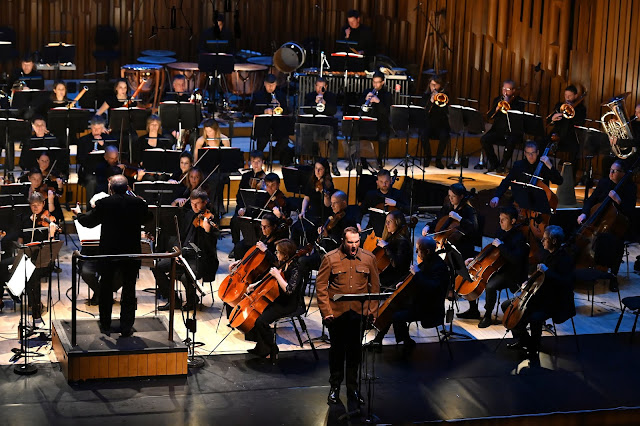 |
| Frances-Hoad: Last Man Standing - Cheryl Frances-Hoad, Tamsin Collison, Marcus Farnsworth, Martyn Brabbins, BBC Symphony Orchestra - Barbican Hall ( BBC/Mark Allan) |
St Giles Cripplegate & Barbican Hall
Reviewed by Robert Hugill on 30 November 2018 Star rating: (★★★★)
A major Cheryl Frances-Hoad premiere in a pair of concerts which focussed on her music alongside that of Bax and RVW
On Friday 30 November 2018, the focus of the BBC Symphony Orchestra's concert at the Barbican Hall under conductor Martyn Brabbins was 1918 and its aftermath with Arnold Bax's November Woods, which was written during the war, RVW's Fourth Symphony (first performed in 1935) which was seen by many to reflect to turbulence of it's era and the premiere of Cheryl Frances-Hoad's Last Man Standing, an orchestral song cycle with baritone Marcus Farnsworth, which also reflected on the First War. Picking up on the Bax and Frances-Hoad connections, the BBC Singers' concert at 6pm in St Giles Cripplegate, Singers at Six, when they were conducted by Ben Palmer, presented choral music by Cheryl Frances-Hoad and Arnold Bax.
The Singers at Six concert pairing of Bax with Frances-Hoad might at first seem an unlikely, but the richness of some of Cheryl Frances-Hoad's choral writing rather chimed in with Bax's striking choral textures. We started with Frances-Hoad's 2015 work, Gaude et Laetare, with lovely brilliant yet complex contrapuntal writing which reminded me of Tippett. Bax's I sing of a maiden (from 1926) started as a simple part-song, with Bax's familiar harmonic inflections gradually creeping in and becoming more significant. Frances-Hoad's This Time is Born a Child (2014) was quite traditional carol-like yet with nice harmonic touches. Bax's This Worldes Joie (1922) had some strikingly vigorous and vivid moment in what is a terrific piece.
Cheryl Frances-Hoad's From the Beginning of the World was written for The Cardinall's Musick in 2015. Frances-Hoad sets excerpts from Tycho Brahe's German Treatise on the Great Comet of 1577, with Frances-Hoad's selections contrasting Brahe's technical descriptions with the emotional effect on society, along with a dead-pan final section saying that there are in fact no reliable grounds for predicting the end of the world from the comet! Frances-Hoad reflected the complexities of the text in her music, both in terms of structure and in terms of content, writing fluidly for the choir using both tutti and smaller groups, with some wonderfully vivid moments. Whilst she was evidently inspired by RVW in this piece, the richness of the harmonies seemed rather aptly closer to those of Bax. This was followed by Floodlight, starlight written in 2011 for Leeds University Chamber Choir, which told a story, very engagingly, using lovely clear textures.
Bax's Five Greek Folk Songs is a relatively late piece (1942) and is certainly not folk-ish (Bax avoided folk song influences in his music), yet there is a delightful lighter-touch in his writing and an engaging story telling element in these five characterful tales, often surprisingly lively and vivid. We finished with Cheryl Frances-Hoad's There is no rose written in 1995, when she was 15, and it won the Bach Choir carol competition. Again, quite a traditional carol shape but with some interesting harmonies.
 |
| Frances-Hoad: Last Man Standing - Marcus Farnsworth, Martyn Brabbins, BBC Symphony Orchestra Barbican Hall ( BBC/Mark Allan) |
A sequence of fifteen songs, sung by Marcus Farnsworth with Martyn Brabbins conducting the BBC Symphony Orchestra, it was in fact more of a monodrama, almost an opera, than a song cycle. The piece took an 'Everytommy' through his war experiences, opening and closing with him revisiting Flanders Fields after the war, it moved from enthusiasm of enlistment through training to the real horrors.
Whilst we could have expected a complex Mahlerian treatment of the subject, the fact that it was created as a mini-opera and that early on in the project Frances-Hoad and Collison rejected the use of Siegfried Sassoon's words, meant that a more demotic treatment was created. Collison's words tended to reflect a more popular style, frequently rhyming in short couplets, and Frances-Hoad's music referenced many of the popular songs of the day. Often, the work did not seem like song at all, but was a complex arioso/recitative sequence with extensive and powerful orchestral interludes.
It was this orchestra writing which gave the work its strength, if our ordinary soldier was unable to express himself in large-scale complex texts then the compensation was the was the orchestra commented and gave us a different point of view. Cheryl Frances-Hoad avoided having the baritone soloist simply singing the popular tunes, and one of the most powerful moments was when Marcus Fansworth almost spoke the text whlist the flutes played the songs satirically, creating a feeling of real bitterness. The vocal writing had a real directness and Marcus Farnsworth gave a powerful performance, but the vocal line seemed sometimes to veer towards the effective rather than the memorable, and you wanted to have some more complex vocal moments when we could move away from the limited nature of the Tommy's utterances. This was a long piece, over 30 minutes, but it never felt it and all concerned gave a fully committed and very engaged performance.
 |
| Frances-Hoad: Last Man Standing - Marcus Farnsworth, Martyn Brabbins, BBC Symphony Orchestra Barbican Hall ( BBC/Mark Allan) |
The violence of RVW's Symphony No.4 startled many of its first listeners, and Martyn Brabbins and the BBC Symphony Orchestra certainly made the first movement incisive and edgy, with Brabbins keeping the movement going, so despite the more eerie moments, the music was notable for its impulse and vigorous. The second movement started intriguingly, the eerieness devloping into intense unease, whilst the third movement definitely had wit yet with an edge. The final movement developed into real force and anger. Brabbins as a conductor does not get worked up on the podium, yet he drew a performance of real anger, force and physicality from the orchestra.
Elsewhere on this blog:
- One crazy day: Jonathan Dove on his new opera Marx in London which premieres at Theater Bonn - interview
- Landscapes of the mind: Anna Þorvaldsdóttir's Aequa (★★★½) - CD review
- Antonio Caldara - cantatas for bass and continuo (★★★½) - Cd review
- Viol music: RCM International Festival of Viols - concert review
- Naturalism and realism: Puccini's La Boheme with Natalya Romaniw and Jonathan Tetelman (★★★★) - opera review
- A 20th century monument: Hindemith's five brass sonatas (★★★★) - CD review
- Old Bones: Nico Muhly, Iestyn Davies and the Aurora Orchestra at Kings Place (★★★½) - concert review
- Storytelling in music: Kevin Puts and his opera Silent Night - interview
- Puccini premiere: Opera Rara gives the original version of Le Willis a rare outing (★★★★) - Opera review
- Long time ago: Samling showcase at the Wigmore Hall (★★★★) - concert review
- A series of concentric circles: Aaron Holloway-Nahum and the Riot Ensemble - interview
- Auf Flügeln des Gesanges: Romantic songs and piano transcriptions from Christoph Prégardien & Cyprien Katsaris (★★★★★) - CD review
- The English Concert in Baroque concertos - (★★★★) CD review
- Widening the audience: I chat to Christopher Glynn about his Schubert in English project - interview
- Home

.jpg)









No comments:
Post a Comment